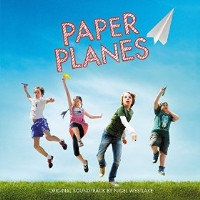- Composed by Nigel Westlake
- ABC Classics / 2015 / 50m
An Australian film aimed primarily at children, Paper Planes sees a teacher challenge his cynical class to put their smartphones away for a bit and get creative, having a competition to see who can build the best paper aeroplane. One of them (who loves flight) is so good at it he starts dreaming of taking part in a competition in Tokyo. The film seems to have taken Australia by storm and has been very successful there, with “inspirational” and “life-affirming” cropping up in most of the reviews I’ve read.
The score is by one of the country’s most prominent composers, Nigel Westlake, whose occasional film scores mix with classical compositions. He has only recently returned to writing for film after suffering a personal tragedy when his 21-year-old son was murdered in 2008; and I hope it isn’t insensitive to wonder if that darkest of moments may have somehow provided extra meaning to the composer of this film of children’s hopes and dreams, of a troubled but then repaired father-son relationship, because his score sees some real magic in the air, a traditional symphonic work that can be added to the list of great music inspired by flight, albeit a very different form of flying from usual.
The album kicks off with the joyous main theme, which after a florid wind-led introduction followed by a strident brassy fanfare simply soars off into the sky, all sections of the Melbourne Symphony Orchestra being put through their paces. Full of youthful exuberance, it’s really quite something. The fun keeps going, with the second primary theme presented in “Ready to Launch”, perhaps even bigger and more rousing than its partner; the cue sees some real emotion on display too, in more reflective moments, and a killer melody for recorder.
The great thing is, the whole score’s like that. Expressing emotion freely and through grand orchestral flourishes, this is the kind of film music that led people like me to first fall in love with film music. It’s not all grandstanding – Westlake seemingly effortlessly switches between that and some genuinely sweet, tender interludes, sometimes within the same cue – such as the third, “Flight Research”, which expertly blends an exploration of the B-section of the main theme with on the one hand some Coplandesque playfulness, on the other some lilting, charming boyish dreaming. The latter is developed further in the lovely “My Journey Starts Here”, contemplative but with an ever-increasing sense of excitement building to a sensational crescendo and gigantic finale.
“Dog Fight” is something different, the first real action music, and it’s brilliantly evocative of those Ron Goodwin scores of the 1960s, full of derring-do. Contrast that with the raw emotion of “A Bird That Cannot Fly”, a fiercely determined optimism the overall feeling even as the melody – at least initially – suggests all may not be well. “Pavane” then expresses that much more obviously – a tragic sadness running through the cue, a gorgeously expressive piano solo. “Take Your Positions” seems at first to be continuing that feeling, but it explodes into life, swirling figures growing ever more urgent. “Do Emus Dream of Flying?” is as cute as its title suggests; sentimental it may be, but who cares?
“The Final Challenge” sees the orchestra soar once more, florid and at times almost balletic, totally enchanting. The recorder returns for “Is There a Movie On This Flight?”, playfully dancing around before the wider wind section does the same. The brief, bustling “Tokyo By Night” feels like Gershwin crossed with Bernstein (Leonard, that is) and is an unexpected interlude, albeit a joyous one. Then, the pièce de résistance – the score’s “Adventure on Earth” or “Rocketeer to the Rescue”, if you will (though not quite at that level – not quite) – the nine-minute “The Competition”, an exhilarating journey around the main themes which sets the pulse racing and the heart pounding and is an absolute treat.
The album’s not quite done – there’s “For As Long As It Takes”, a beautiful conclusion to the score, and a fine song by Lior, “Learn to Live”. Paper Planes is some album. If you loved the music of John Williams, Jerry Goldsmith and James Horner in the 1980s then you will love this. Full of soaring melodies, unabashed expression of emotion – there is precisely nothing here that I do not love. The film and score were released in Australia just two weeks into 2015 – and I can already say that it’s going to be some year of film music if anything tops this.
Rating: *****
facebook.com/moviewave | twitter.com/MovieWaveDotNet | amazon.com













The samples sound great. Unfortunately it’s download only…
There’s a CD if you’re willing to pay import costs. https://shop.abc.net.au/products/nigel-westlake-mso-lior-paper-planes-cd Those are AU dollars, not US dollars.
Thanks, good to know!
You can get this album (a few dollars cheaper) here, too: https://www.jbhifi.com.au/music/Whats-Hot/soundtrack/paper-planes-ost/663611/
For Americans who would like to listen to this score on a physical medium, the album is, at the time of this posting, now available on US Amazon for a very cheap price! Great review as always — thank you James for covering this score! Hopefully there’s more Westlake to come in the future (I’m still gunning for a release to his Babe: Pig In The City score).